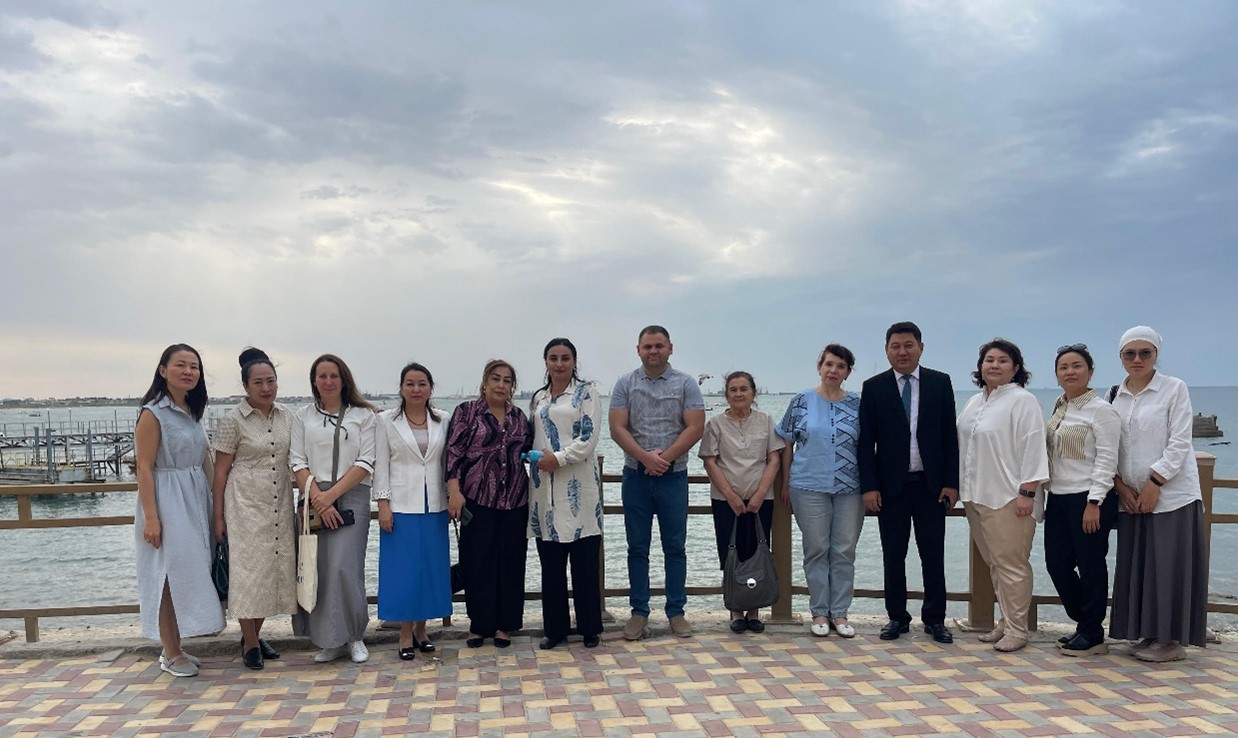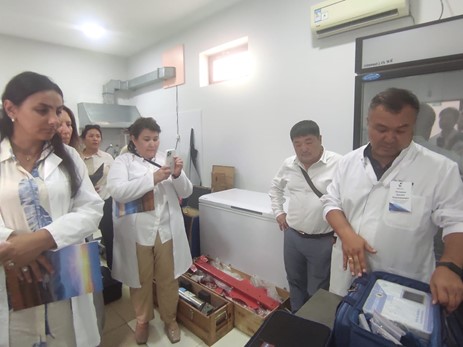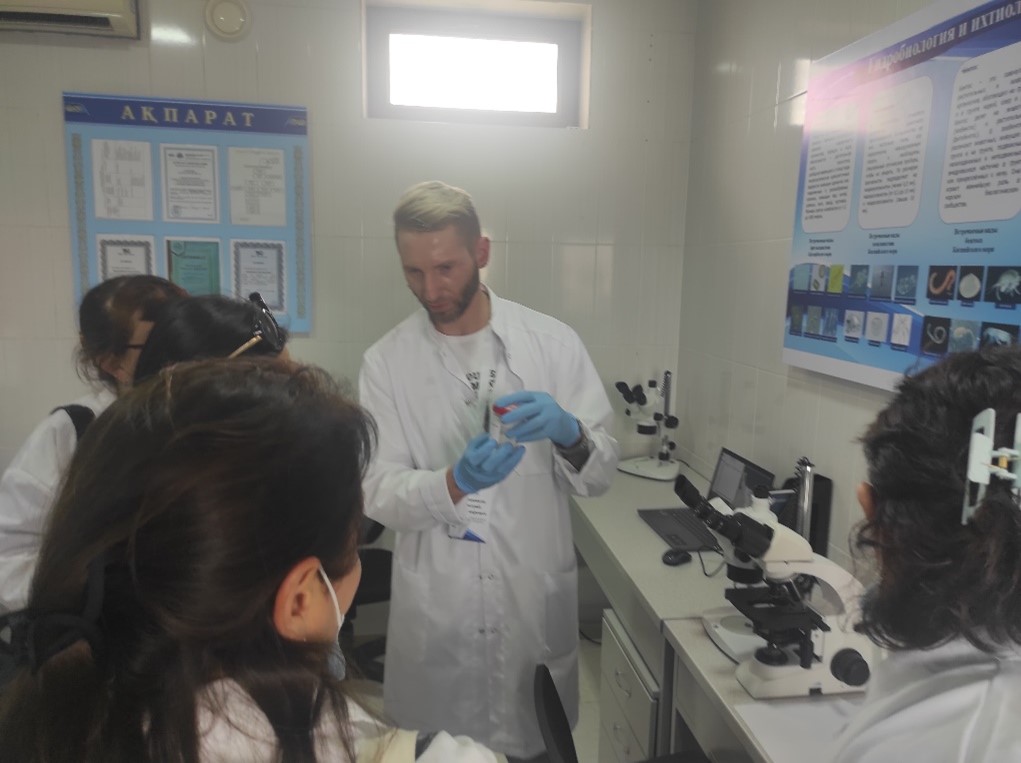On August 26, 2024, an exchange visit of water quality laboratories took place in Aktau, Republic of Kazakhstan, organized within the framework of the Regional Working Group on Water Quality (RWG-WQ) Action Plan. The need for the exchange visit was identified at the sixth meeting of the RWG-WQ, which was held last December in Astana. The event was organized with the assistance of the Ministry of Ecology and Natural Resources of the Republic of Kazakhstan (MENR RK) and the Regional Environmental Centre for Central Asia (CAREC).

12 representatives of the hydrometeorological services of Kazakhstan, Kyrgyzstan, Tajikistan and Uzbekistan met with advanced Kazakh laboratories involved in water quality monitoring of the Caspian Sea to exchange experience. The participants visited the testing laboratory of "Kazakhstan Agency of Applied Ecology" LLP (KAAE) and the hydrobiological laboratory of "Nomad ECO" LLP.

At the beginning of the meeting the participants exchanged welcoming speeches. Mr. Armat Dzhusupkaliev, Head of the Department of Ecology of Mangistau Oblast, thanked the Blue Pease project for the opportunity to meet to exchange experience with colleagues from countries geographically distant from Western Kazakhstan. He also emphasized that the Caspian Sea may repeat the fate of the Aral Sea if no joint measures are taken to conserve biodiversity and protect the water body from pollution and shallowing.

Irina Yugay, CAREC specialist and representative of the Blue Peace Project, noted that "the geographical expansion of the RWG will allow its members to obtain unique knowledge from advanced laboratories on surface water quality in Kazakhstan. In the second phase of the Blue Peace Project, which will start in mid-2025, further support to the work of the RWG-WQ and improvement of cooperation between the countries through joint water monitoring and exchange visits involving upstream countries - Kyrgyzstan and Tajikistan, will be a priority of the project".

The participants of the meeting got acquainted with the equipment and methods of the Chemical Analytical Center of the Testing Laboratory of KAAE LLP, exchanged information on the applied methods and determined parameters of natural and waste water, air and soil quality, which are used for complex assessment of their pollution degree. KAAE currently performs various types of environmental monitoring onshore and offshore, including baseline monitoring studies and industrial environmental monitoring. The laboratory is accredited and includes a hydrobiological testing laboratory, a chemical-analytical laboratory and a mobile environmental laboratory. The main customers of KAAE are large industrial enterprises, such as Agip KCO, Tengizchevroil, Karachaganak Petroleum Operating, as well as state bodies of the Republic of Kazakhstan, including the Fishery Committee and the Department of Natural Resources and Nature Use Regulation, among others.

KAAE staff willingly shared information about the ongoing research, which allows obtaining data on the hydrological regime of water bodies, including the Caspian Sea, which is important for assessing the state of aquatic ecosystems, forecasting possible changes and developing measures to regulate them. Having research vessels in its arsenal, "KAAE" LLP conducts joint studies of the Caspian seal population with Russian research institutes. Using modern laboratory equipment, detailed analyses of the chemical composition of water and bottom sediments are carried out. For example, the method of atomic absorption spectrometry (AAS) makes it possible to detect 74 toxic elements, including heavy metals, both in liquid and solid samples. However, simpler so-called classical methods are also used, such as the pipette method for analyzing the particle size distribution of bottom sediments.
"We can't know everything, so it's never too late to learn from each other. I think it was a successful exchange of experience. When I return, I will definitely tell my colleagues from the soil laboratory what methods need to be improved and additionally used. If necessary, we will send them here for training", - shared her impressions Madalieva Saliya, Head of Analytical Water Quality Control Department in the field of environmental protection of Uzbekistan.

After lunch there was a visit to the hydrobiological laboratory of Nomad ECO LLP. The laboratory staff demonstrated modern equipment used for analysis of hydrophysical and hydrochemical parameters of seawater, microbiological composition of bottom sediments, as well as for ichthyological and hydrobiological studies. The participants had an opportunity to examine marine phytoplankton, zooplankton on microscopes, as well as to conduct express analyses of benthos (a set of plant and animal organisms living in the sea soil) endemic to the Caspian Sea.

After the demonstration of the analyses, a discussion was held on the causes of water level changes in the Caspian Sea. The laboratory staff connect the Caspian shoaling with climatic, geological and anthropogenic factors. "The lack of connection between the sea and the ocean leads to constant changes in its level. Over the past three years, the sea level has fallen by 1.5 meters. In recent years, maximum water evaporation rates have been observed when exceptionally hot and dry weather is established in the region in summer," the laboratory representatives explained.

Anna Sabirbaeva, General Director of Nomad Eco LLP, noted that the lack of data exchange on the state of the environment and sea water between coastal countries is the main reason for the continuous deterioration of the Caspian Sea. She expressed concern about the weak cooperation of the countries in providing results on measures taken on identified sources of pollution, as well as the lack of joint mechanisms for counteraction, suppression and prevention of pollution offenses from oil producing companies, as not all Caspian countries strictly control discharges from offshore oil tankers.
In general, the meeting participants repeatedly drew parallels between the Caspian Sea and the Aral Sea, emphasizing the importance of establishing permanent links between all countries that share a common water body. Such interaction is ensured through platforms such as the RWG-WQ, which provide a space for technical dialog between countries on water quality issues to develop joint measures to preserve aquatic ecosystems for future generations.
Additional information:
Tais Reznikova, Program Manager, Water Initiatives Support Program, CAREC, treznikova@carececo.org
The Regional Working Group on Water Quality (RWG-WQ) was established in 2009 at the initiative of UNECE and CAREC. The group includes representatives of national ministries and agencies on hydrometeorological and sanitary-epidemiological supervision, as well as water resources management and environmental protection of the countries in the region.
Since 2019, the activities of the RWG-WQ are supported by the Blue Peace Central Asia initiative of the Swiss Agency for Development and Cooperation. Thanks to this support, the RWG-WQ has developed into an expert platform that provides an opportunity for active technical dialog and open discussions on water quality issues at the transboundary level. Regular meetings are held 1-2 times a year.
